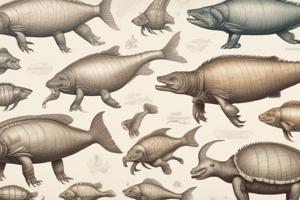Podcast
Questions and Answers
Which type of animals lack a spinal column and do not have internal organs enclosed within protective tissue?
Which type of animals lack a spinal column and do not have internal organs enclosed within protective tissue?
- Vertebrate animals
- Invertebrate animals (correct)
- Mammals
- Birds
What is a common trait of invertebrate animals related to their bodies?
What is a common trait of invertebrate animals related to their bodies?
- Hard exoskeletons
- Mucous covering (correct)
- Internal cavities
- Spinal column
Which of the following is an example of an invertebrate animal?
Which of the following is an example of an invertebrate animal?
- Whale Shark
- Giraffe Spider (correct)
- Quokka
- African Pygmy Goat
What is the main role of the circulatory system in vertebrate animals?
What is the main role of the circulatory system in vertebrate animals?
Which vertebrate animal is known for being the largest fish in the world?
Which vertebrate animal is known for being the largest fish in the world?
What is the main characteristic that distinguishes vertebrates from invertebrates?
What is the main characteristic that distinguishes vertebrates from invertebrates?
Which group of animals lacks a backbone but still exhibits complex behaviors and structures?
Which group of animals lacks a backbone but still exhibits complex behaviors and structures?
Which animal is an example of an invertebrate from the provided text?
Which animal is an example of an invertebrate from the provided text?
What is a key characteristic of vertebrate animals related to body support and protection?
What is a key characteristic of vertebrate animals related to body support and protection?
Which group of animals has a well-developed nervous system allowing them to sense, process information, and respond to stimuli?
Which group of animals has a well-developed nervous system allowing them to sense, process information, and respond to stimuli?
Flashcards
Animalia Kingdom
Animalia Kingdom
The kingdom that includes all multicellular organisms that are eukaryotes and heterotrophs, meaning they have cells with nuclei and obtain nutrients from other living things.
Vertebrates
Vertebrates
Animals with a backbone, also known as a spinal column, made of bone, cartilage, or both. They have internal organs protected by tissues.
Invertebrates
Invertebrates
Animals without a backbone. They are incredibly diverse and include creatures like insects, spiders, and jellyfish.
Skeletal System (Vertebrates)
Skeletal System (Vertebrates)
Signup and view all the flashcards
Muscular System (Vertebrates)
Muscular System (Vertebrates)
Signup and view all the flashcards
Nervous System (Vertebrates)
Nervous System (Vertebrates)
Signup and view all the flashcards
Digestive System (Vertebrates)
Digestive System (Vertebrates)
Signup and view all the flashcards
Circulatory System (Vertebrates)
Circulatory System (Vertebrates)
Signup and view all the flashcards
No Spine (Invertebrates)
No Spine (Invertebrates)
Signup and view all the flashcards
Mobility (Invertebrates)
Mobility (Invertebrates)
Signup and view all the flashcards
Study Notes
Animals
Animals are multicellular organisms belonging to the kingdom Animalia. They are characterized by being eukaryotes (cells with nuclei) and heterotrophs (organisms that obtain their nutrients from other living things). There are two main classifications of animals based on the presence of a backbone: vertebrates and invertebrates. Let's explore these categories further.
Classification of Animals
Vertebrates
Vertebrates possess a spinal column made of bone, cartilage, or a combination of both, and they have internal organs protected by tissues. Examples of vertebrates include mammals (like humans), birds, reptiles, amphibians, and fish.
Invertebrates
Invertebrates do not have a backbone; however, they still display complex behaviors and structures. This group is much more diverse than vertebrates and includes insects, arachnids (spiders), mollusks (snails, clams), jellyfish, starfish, cephalopods (octopuses, squid), annelids (earthworms), and many others.
Characteristics of Vertebrate Animals
Some key characteristics of vertebrate animals are:
- Skeletal System: These animals have bones or bony skeletons, which provide support and protection.
- Muscular System: Their muscles help them move around, manipulate objects, and regulate body temperature.
- Nervous System: A well-developed nervous system allows them to sense, process information, make decisions, and respond to stimuli.
- Digestive System: They digest food internally and absorb nutrients through specialized cells called epithelial cells.
- Circulatory System: Their blood circulates oxygen and nutrients throughout the body and removes waste products.
Characteristics of Invertebrate Animals
Invertebrate animals share several common traits:
- No Spine: They lack a spinal column and do not have internal organs enclosed within protective tissue.
- Simple Bodies: Many invertebrates have simple bodies without internal cavities.
- Soft Body Parts: Most invertebrates have soft body parts, such as a hard exoskeleton in insects or a mucous covering in sponges.
- Mobility: Many invertebrates can move freely in their environment due to having limbs or appendages like legs, wings, or tentacles.
Examples of Vertebrate Animals
Some examples of vertebrate animals include:
- Humans: Modern humans belong to the species Homo sapiens and are classified as primates.
- Whale Sharks: Largest fish in the world, growing up to 41 feet in length and weighing up to 17 tons.
- Quokka: Small marsupial native to Western Australia known for its friendly disposition.
Examples of Invertebrate Animals
Examples of invertebrate animals include:
- Ant: Social insect that is divided into three groups: workers, soldiers, and queens.
- Giraffe Spider: Large jumping spider found primarily in Africa, named for its long neck and legs.
- African Pygmy Goat: Miniature goat species native to West, Central, and Southern Africa.
Studying That Suits You
Use AI to generate personalized quizzes and flashcards to suit your learning preferences.




